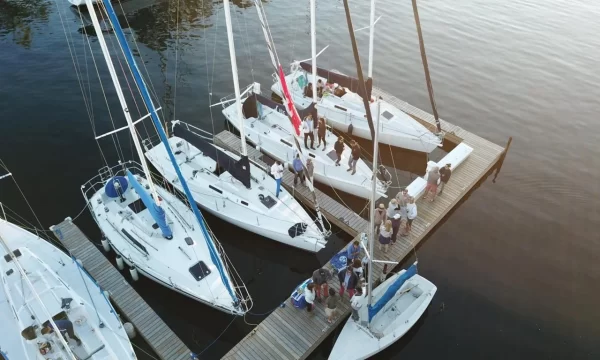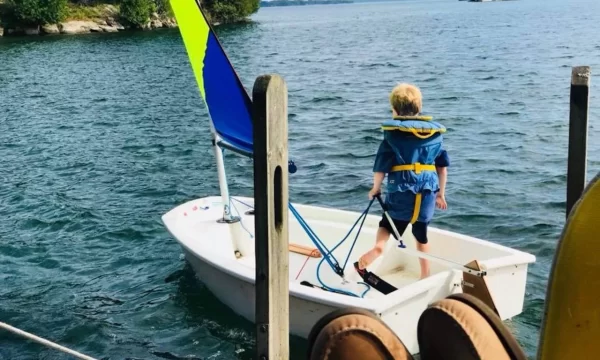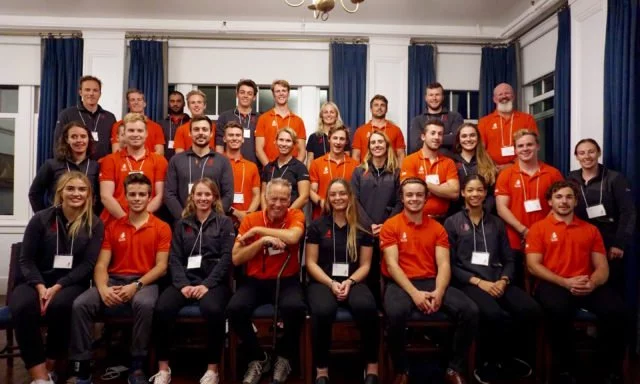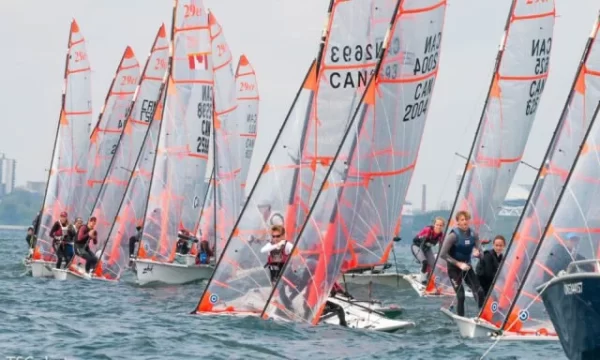 Sandy MacMillan was inducted into the Canadian Sailing Hall of Fame on Sunday, October 3, after he won World Championships titles in the Soling class in 1977 and 1980 along with Andreas Josenhans and Glen Dexter. ÛÏOn DeckÛ conversation with the sailor from Nova Scotia.
Sandy MacMillan was inducted into the Canadian Sailing Hall of Fame on Sunday, October 3, after he won World Championships titles in the Soling class in 1977 and 1980 along with Andreas Josenhans and Glen Dexter. ÛÏOn DeckÛ conversation with the sailor from Nova Scotia.
Congratulations for being inducted this year into the Canadian Sailing Hall of Fame. How does it feel?
It feels pretty much the same as any other day. It’s always nice to get accolades, awards and things like that, but the accomplishments that are being recognized are from a long time ago. Of course, it makes you feel older, that’s for sure! You hear “Hall of Fame” and you think, “oh-oh, I must be nearing the end of my career” but, fortunately, I’m still sailing all of the time and that’s the beauty of sailing as you can continue on. You don’t have to end your career. You can do other things in sailing because it’s a lifetime sport.
You were crowned champion for the Soling Class at the 1977 and 1980 World Championships. How did it feel when you realized you had finished first?
I remember the 1977 event because it was our first and it was in Norway, and we were given the trophy by the king of Norway, King Olav at the time. And Norway, of course, is the central point for the Soling as it was designed in Norway. It was a wonderful World Championship for us. We were there with a lot of other good Canadians because we were very strong in the Soling class in the 1970s and 1980s.
In 1980, it was a kind of a bittersweet feeling. We were out of the last event for the Olympic trials and we did win the World Championship, but we weren’t selected for the Olympic Team in accordance with the point system. So, in a way, we were happy to have won the World Championship but we were dejected at the same time. But the other sidenote of that is that there was a boycott that was actually announced midway through the World Championships. We were pretty sure there wasn’t going to be an Olympic participation by Canada, because we would probably fall under the US foreign policy rule of trying to punish Russia. Interestingly enough, the reason for the boycott, Afghanistan, is still in the news, isn’t it?
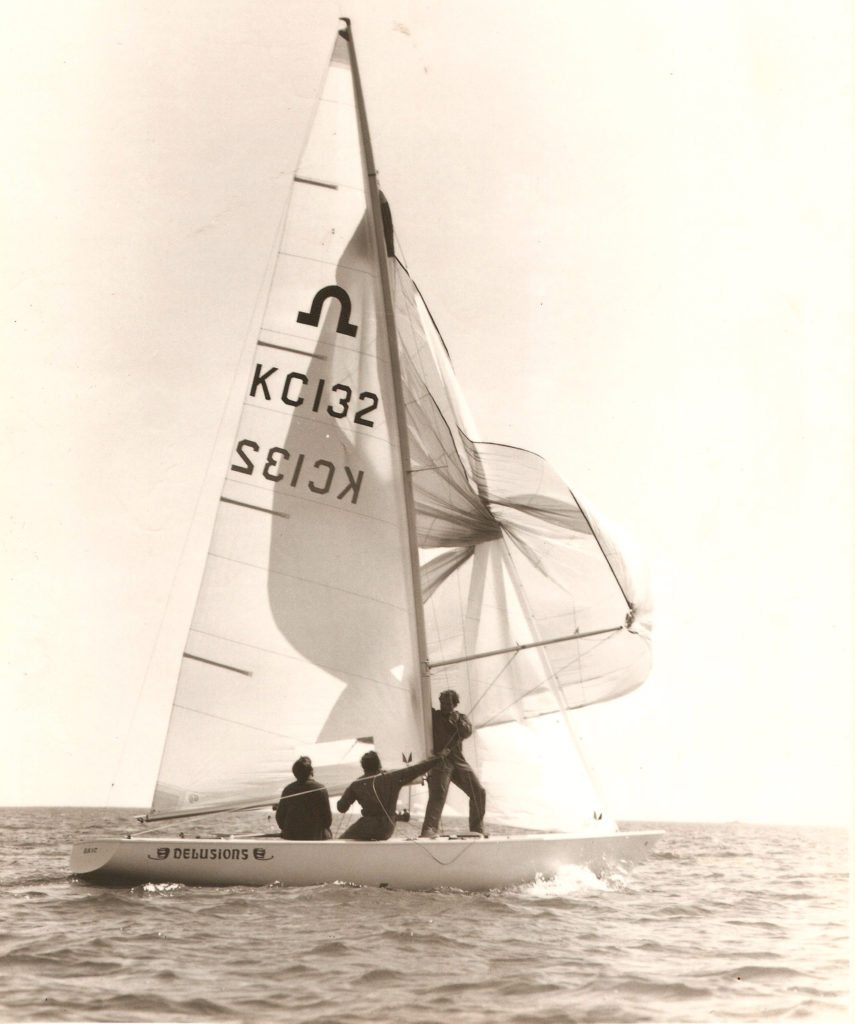 You won those titles with Glen Dexter and Andreas Josenhans. What do you remember most about them?
You won those titles with Glen Dexter and Andreas Josenhans. What do you remember most about them?
I see them a lot. We’re still best friends. Andreas and Glen are both living in Lunemburg and I work there. I remember a lot about them. There is no particular memory that stands out. We’ve had a lot of sailing adventures together since.
Except for the medal, what is your fondest memory from the 1977 World Championships?
I guess it would be being in the same league as Buddy Melges, who was one of our mentors, as well as Hans Fogh and Wilhelm (Willi) Khuweide from Germany, guys like that who were really top-notch Soling sailors. And, in Norway, we had great memories.
Except for the medal, what is your fondest memory from the 1980 World Championships?
We had a situation where we were over the line, really, by a lot. We had to do a full on back turn, straight back down, go back to the line and recross over at the start. In a fleet of forty-plus boats, you would expect that in that type of event — with the kind of talent that was there and the breeze, you were not going to have much space to pass, you know. We finished 13th and that was a big deal after some pretty big power reaches, which we were pretty good at in those days. So my greatest memory is our comeback in that race and, subsequently, a couple of other races we won pretty handily but it was in lighter air.
You took 8th spot at the 1976 Olympic Games in Montreal. How did that feel?
Interestingly there, we focused on winning the trials. That was our thing. We didn’t really think we were a medal contender until the fourth race of the Olympics in Kingston, that we won. And we had another third-place finish so, all of the sudden, we were ascending and doing very well. So, my fondest memory is winning an event at the Olympics, a race, but unlike swimmers, we don’t get a medal every time we hit the pool. It’s about a series of races. We reflected on that and we realized we actually had some talent, but it’s just that we weren’t always able to put it all together, although we were all confident that we could. It’s still a great feeling.
What do you remember the most about the 1976 Olympic experience?
It’s like what I do with my kids: I look at the high and the low. The high was certainly walking into Olympic Stadium as Canadians. Last team to go in, the host nation. It was fantastic. My heart was in my throat. The whole stadium seemed to be just crashing down on us because it was so loud. It was a pretty overwhelming experience which I still remember.
I also remember being in Kingston, which is a great city. We loved Kingston and still do. It’s a wonderful place to be. When we did get on the bus to Montreal for the opening ceremony, being in the big city, coming from a small world in Nova Scotia, was a little overwhelming. We were much more comfortable in Kingston.
One other experience is that we had a pretty interesting party at our residence, which is where we lived. We didn’t stay at the Olympic village because these were the Olympics that immediately followed Munich, so security was extremely high. We opted to live as Canadians in our own situation and apartment and, at the end of the Games, we had a big party and, I must say, we probably spilled over on the street… and Kingston police were such a nice bunch of guys! They came down and sort of looked at us and said this is not going to die down any time soon so I guess we will close the street, which they did. We love Kingston. We will always be grateful for the time we were there because it was a great experience.
The low for us was the last race, where we were in a pretty good position. We hit the mark. We actually have that photo pretty much in each of our minds and also on our walls. We call it: “The Jibe”. But it made us stronger, we realized that you have to be very aware of everything that’s going on all the way around the race course. We managed to get back a little bit on that, but it did affect our chance for, I wouldn’t say getting a medal because I don’t think we were ever in contention there, but we could have been fifth and we ended up eight.
How did this experience in Montreal have an impact on the rest of your career?
The main thing is that we decided to go for the next quadrennial towards 1980 and we did so. That really had an impact on our Soling career because we had a pretty good record going through those four years. We won two World Championships and came second in another. We had it on the go. We had what we considered to be the fastest boat and we had two or three of them during that period. We had a very good tuning situation. For the rest of our career, we knew how to really get a boat up and make it go fast. It was all part of our mantra which is “feel the boat, get things in our nuances, get them sorted out and find out what are the little extra measures of speed and how to use them”. Certainly, Glen and Andreas had a special feel. I was someone new in sailing at the time as I had only been sailing competitively for about two years at that point, really, but it impacted the rest of my career because I became a sailmaker.
What did you do following your career as an international athlete?
We started out in the sailmaking business together between 1977 and the 1980s. This is the way we funded our programs and we also learned a lot about other types of sailmaking, sails and sailing in the sport, such as cruising, racing and offshore sailing. Hans was a sailmaker, so it seemed a logical thing and that is what we ended up doing.
What do you do now?
I’m still a sailmaker. I own a marine store in Halifax. We do rigging and all kinds of stuff for ships, yachts and commercial vessels.
Do you continue to sail?
We all do! We have cruising boats, we sail on Sonar and bigger boats, offshore boats. We have made it a lifetime sport for ourselves.

